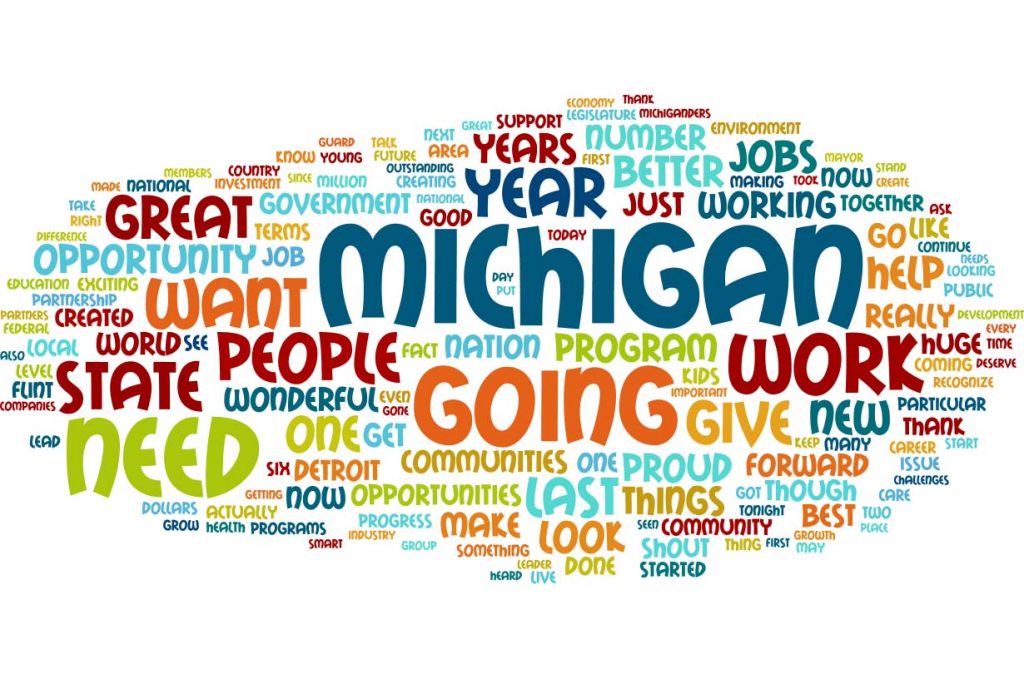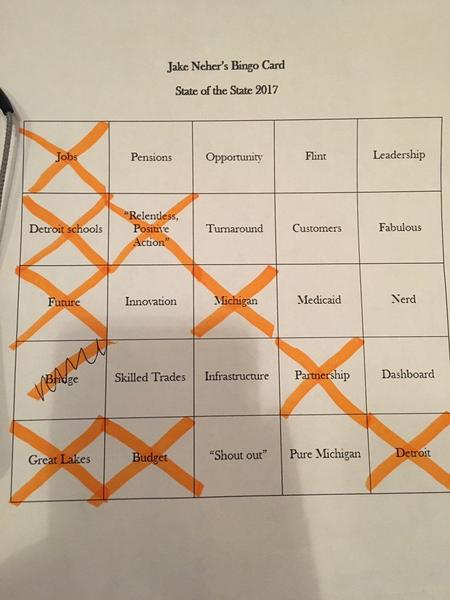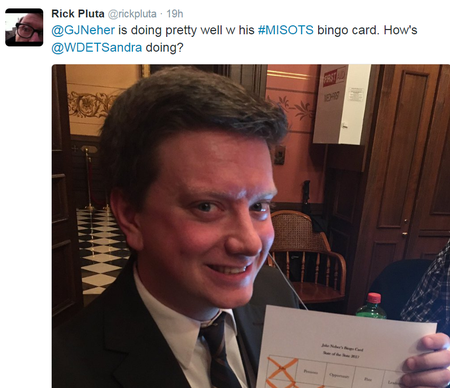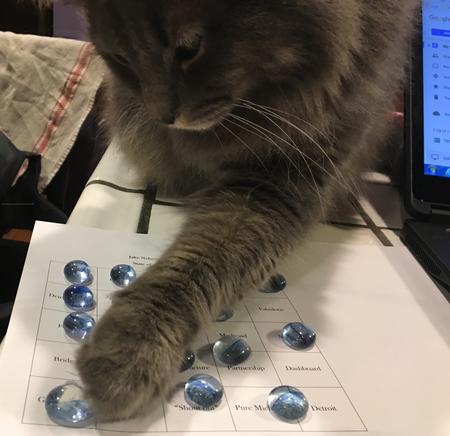The 2017 State of the State “Bingo” Contest
Did “data” or “experience” design a better bingo card for Snyder’s 7th State of the State speech?


When Gov. Rick Snyder started his 2017 State of the State address Tuesday evening, WDET’s Jake Neher and Sandra Svoboda were listening, hunched over their “bingo” cards.
As Snyder uttered each of the 25 words printed in their squares, Neher and Svoboda marked them off. They agreed to both use “Michigan” in the center spot.
It was a friendly bet – as in no one had to buy the other one anything, wear clothing from the other’s alma mater, or perform some other mildly humiliating prank. But there were some bragging rights on the line: Neher’s card was based on his knowledge and experience as a producer of WDET’s Detroit Today with Stephen Henderson program and his four years working as state Capitol reporter for the Michigan Public Radio Network.
“I’ve been in the room for every State of the State address since 2013 and have become very familiar with all of Gov. Snyder’s favorite buzzwords and catch phrases,” says Neher.
Svoboda, on the other hand, designed her card using some data and probability. In advance of the speech, she and some coworkers analyzed the text of Snyder’s previous six SOTS speeches. They looked at how many times he said certain words and what some of the rhetorical trends were over his previous six addresses.
Drawing mostly on the data, a little bit of probability and a few chances, Svoboda mapped out her card, seeking to not only pick the words he would say but to place them on her card in ways that would most likely give her a full row as related words were spoken near to each other.
For example, she put education-related words in one row and “Flint” and “water” together in another.
“Not to discount the value of experts like Jake, but we wanted to see how well the data and the governor’s record could predict how quickly and if at all he would say certain things this year,” she says.

The contest played out in real time on Twitter. MPRN’s Rick Pluta tweeted a photo of Neher with his card as it got cluttered with orange squares. Svoboda, in a nod to the Internet’s most popular subject matter, shot out a photo of her cat messing with the beads she was using to track the progress on both cards.

Neher declared himself the winner first on Twitter, but Svoboda missed Snyder saying “legislature” in the opening of the speech which would have given her the early win. In a showing of public radio civility, the two declared a tie.
(They’ve yet to validate all the results, but the full text of the speech is here.)
But what was perhaps most telling about their methods was at the conclusion of Snyder’s 54-minute speech, Svoboda had only “Flat Rock” uncovered. Neher was missing five of his 25 predicted words.
“I was feeling pretty confident from early on in the speech, especially after hitting a bingo within 20 minutes of the beginning of the address,” Neher says. “And I was pretty proud of hitting 19 out of 25 spaces. That is, until I saw Sandra’s card.”
Svoboda, for her part, was a bit smug about hitting 24 of 25 words. “Snyder not saying ‘Flat Rock’ was my only miss,” she says. “That was the biggest gamble but because it was such a huge investment that was announced and so recently in the news and in a geography Snyder hadn’t previously mentioned much, I went with it.”
Both WDET staffers failed to anticipate some of the governor’s most memorable quips of the night.
“I’m still kicking myself for leaving off ‘Michigan Cows,’” Neher says.
One bingo game for a governor’s speech certainly does not definitively prove that data and statistics are always better than experts’ knowledge and opinions for use in decision making or predictions.
But the game is part of a movement where the “Super Crunchers” of data are testing when and how numbers beat people for accuracy.
So for those looking to use Snyder’s first seven speeches to predict his eighth and final one next year, here are the metrics of some of the words from Neher’s and Svoboda’s squares and what are issues in Michigan:
State of the State Speeches and Word Use: 2011-2017
Click on each bar to see how often Snyder used the word in each speech:
WDET Research Associate Melissa Mason and Interns Kevin Moore and Clara Ruffin contributed to this report.
